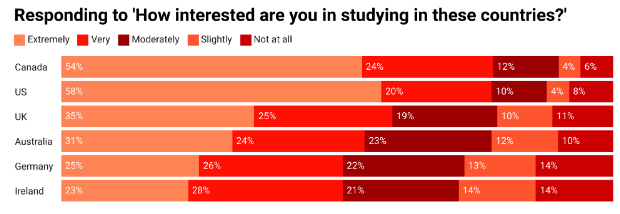A recent survey has revealed that Canada continues to be the most preferred destination for international students, despite the diplomatic dispute with India and new visa restrictions. A report by a source found that a 94% of respondents still prefer Canada over other destinations.
Canada’s appeal to international students can be attributed to its high-quality education, affordability, and post-study opportunities. According to Statistics Canada data, Indian students made up a staggering 41% of all study permits issued in Canada by 2022. However, the diplomatic tensions between India and Canada in late 2023 had immediate repercussions on educational exchanges, with study permits issued to Indian students plummeting by 86% in the fourth quarter of 2023.
Despite these challenges, Canada’s fundamental advantages have ensured its appeal to international students. The survey found that affordability is the primary factor influencing program selection, cited by 77% of students. Although the financial requirements for international students have doubled, Canada’s overall value proposition in terms of education quality relative to cost remains competitive.

While traditional destinations like Canada, the US, and the UK still command interest, the survey highlights several emerging destinations gaining popularity. Denmark has become attractive due to its high-quality education system, English-taught programs, and emphasis on innovation and sustainability. Finland’s growing reputation for educational excellence, free tuition for EU students, and relatively affordable options for non-EU students have increased its appeal.
Nigeria’s emergence as a study destination results from its investment in higher education, English-language instruction, and cultural diversity. Germany is also witnessing a steady rise in preference among Indian students, not only for its academic offerings but also for the quality of life it provides. With increasing awareness around mental well-being and work-life balance, Germany’s structured academic environment, 35–40 hour work weeks, and 30 days of annual leave enable students to maintain balance and reduce stress during their time studying abroad.
Affordability plays a key role in Germany’s growing appeal. Most public universities offer tuition-free education, making the overall cost of studying in Germany significantly lower than in destinations like the US and UK. This cost advantage, combined with the ability to take up part-time jobs and internships, allows students to manage living expenses independently and pursue higher education without heavy financial pressure.
The survey found that over 25% of students are reconsidering their initial study destinations due to rising costs, exploring more affordable provinces or institutions within Canada, or considering emerging alternatives. Interest in postgraduate studies, particularly doctoral programs, has risen by 4 percentage points year-over-year, indicating a growing demand for advanced education.
In conclusion, Canada remains the top choice for international students despite diplomatic tensions and visa restrictions. The country’s high-quality education, affordability, and post-study opportunities continue to attract students from around the world. However, emerging destinations like Denmark, Finland, Nigeria, and Germany are gaining popularity, offering alternative options for students seeking quality education and a unique cultural experience. As the global higher education landscape continues to evolve, it will be interesting to see how these trends shape the future of international student mobility.


